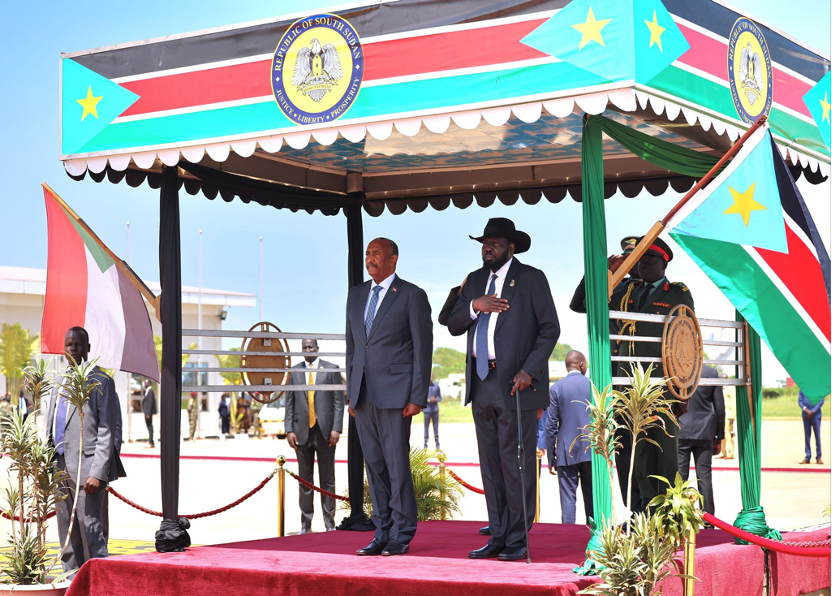Obstacles mount for South Sudan’s oil transport through Sudan

Abdelfattah El Burhan (L) meets with South Sudanese President Salva Kiir Mayardit in Juba, the capital of South Sudan, September 16 (Photo: SouthSudanGov via X)
Despite commitments made last week by Sudan’s de-facto leader Abdelfattah El Burhan and South Sudanese President Salva Kiir Mayardit to resume the transport of South Sudan’s oil through Sudanese territory, the presence of the Rapid Support Forces (RSF) in areas where critical oil pumping stations are located has reportedly stalled progress.
In a meeting in Juba, the capital of South Sudan, on Monday, Burhan and Kiir agreed to form a joint committee between the oil ministries of both countries to “eliminate obstacles and devise an operational plan to restart the flow of South Sudan’s crude oil”.
Speaking to Radio Dabanga, former Undersecretary of the Sudanese Ministry of Energy Hamid Suleiman stressed that the agreement’s success hinges on resolving the conflict between the Sudanese Armed Forces (SAF) and the RSF. “Without a ceasefire or agreement between the two warring factions, it remains unlikely that oil transport can safely resume.”
Many key oil facilities remain under RSF control, making their security a major concern. “Ensuring the safety of workers, including technicians and engineers, will be essential to resume operations”, Suleiman said during the interview.
February halt
The transport of South Sudan’s crude oil through Sudan has been halted since February, leading to major losses for both countries. The halt has primarily been attributed to technical issues caused by a shortage of diesel required to heat South Sudan’s waxy crude oil at key pumping stations .
“Without sufficient heating, the crude oil solidified inside the pipeline, leading to blockages and a rupture between the stations”, Suleiman explained. The crude oil is pumped from South Sudan to Bashayer Port in Sudan’s Red Sea state via a series of six stations, “several of which are now compromised by the RSF”.
In March, the Sudanese Minister of Oil informed his South Sudanese counterpart that a rupture occurred in a section of the pipeline passing through a conflict zone. Last week, the RSF accused the SAF of bombing the El Ailafoun oil station, located on the pipeline and controlled by the RSF since October.
Economic impact
The suspension of oil flow has had severe economic repercussions. South Sudan has lost significant revenue since the pipeline was shut down in February, with the country reportedly missing out on $100 million in monthly earnings.
South Sudan, which relies on oil for over 90 percent of its government expenditures, is losing $100 million per month, according to previous statements by South Sudan’s former finance minister, Awow Daniel Chuang.
“Sudan, which receives transit fees from the arrangement, is also suffering financially, with losses estimated at $24 per barrel for the 150,000 barrels of oil transported daily”, Suleiman told Dabanga.
Experts warn that continued disruptions could lead to irreparable damage to the pipeline, which is valued at $2.3 billion. “If the crude oil remains frozen in the system for an extended period, the entire line could be destroyed, severely impacting both countries’ economies”.
Suleiman emphasised that while the technical infrastructure is ready to resume pumping, only a political resolution between the two warring parties can ensure the safe flow of oil.
He argued that restoring oil transport would not only benefit both countries economically but also foster stronger ties and possibly promote peace, hinting at future opportunities for greater unity between Sudan and South Sudan.











 and then
and then